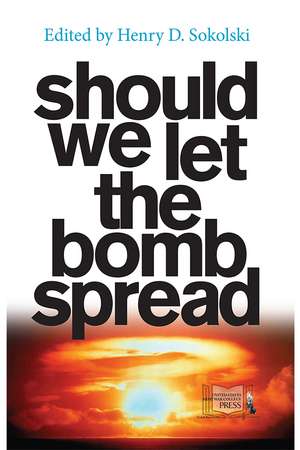Should We let the Bomb Spread?
Editat de Henry D. Sokolski, Army War College (U.S.), Strategic Studies Institute (U.S.) Autor Nonproliferation Policy Education Center (U.S.)en Limba Engleză Paperback – 26 ian 2017 – vârsta ani
Nuclear
deterrence
and
nonproliferation
no
longer
enjoy
the
broad
support
they
once
did
during
the
Cold
War.
Academics
and
security
experts
now
question
the
ability
of
either
to
cope
or
check
nuclear
rogue
states
or
terrorists.
On
the
one
hand,
America’s
closest
allies—e.g.,
Japan
and
South
Korea—believe
American
nuclear
security
guarantees
are
critical
to
their
survival.
If
the
United
States
is
unwilling
to
provide
Tokyo
or
Seoul
with
the
assurance
they
believe
they
need,
would
it
then
not
make
sense
for
them
to
acquire
nuclear
forces
of
their
own?
On
the
other
hand,
with
more
nuclear-armed
states
and
an
increased
willingness
to
use
them,
how
likely
is
it
that
nuclear
deterrence
will
work?
This
volume
investigates
these
questions
and
results
in
a
rich
debate
that
goes
beyond
current
scholarship
to
challenge
the
very
basis
of
prevailing
nonproliferation
and
security
policies.
Audience: Political scientists, international relations scholars, defense planning strategists, military leaders, foreign policy advocates, and foreign interest leaders may find this resource about nuclear security helpful towards the goal to foster deterrence.Military science, global communications, public administration, and international affairs students enrolled in degree programs may find this text useful for research about nuclear deterrence and nonproliferation discussions.
Related products:
Thucydides Was Right: Defining the Future Threatcan be found here: https://bookstore.gpo.gov/products/sku/008-000-01146-0
The Armed Forces Officercan be found here: https://bookstore.gpo.gov/products/sku/008-000-01234-2
Charting a Course: Strategic Choices for a New Administrationis available here: https://bookstore.gpo.gov/products/sku/008-000-01231-8
Other products produced by theUS Army War College, Strategic Studies Institutecan be found here: https://bookstore.gpo.gov/agency/1609
Audience: Political scientists, international relations scholars, defense planning strategists, military leaders, foreign policy advocates, and foreign interest leaders may find this resource about nuclear security helpful towards the goal to foster deterrence.Military science, global communications, public administration, and international affairs students enrolled in degree programs may find this text useful for research about nuclear deterrence and nonproliferation discussions.
Related products:
Thucydides Was Right: Defining the Future Threatcan be found here: https://bookstore.gpo.gov/products/sku/008-000-01146-0
The Armed Forces Officercan be found here: https://bookstore.gpo.gov/products/sku/008-000-01234-2
Charting a Course: Strategic Choices for a New Administrationis available here: https://bookstore.gpo.gov/products/sku/008-000-01231-8
Other products produced by theUS Army War College, Strategic Studies Institutecan be found here: https://bookstore.gpo.gov/agency/1609
Preț: 197.82 lei
Nou
Puncte Express: 297
Preț estimativ în valută:
37.86€ • 39.38$ • 31.25£
37.86€ • 39.38$ • 31.25£
Carte indisponibilă temporar
Doresc să fiu notificat când acest titlu va fi disponibil:
Se trimite...
Preluare comenzi: 021 569.72.76
Specificații
ISBN-13: 9781584877349
ISBN-10: 1584877340
Pagini: 217
Dimensiuni: 152 x 229 x 19 mm
Greutate: 0.37 kg
Editura: United States Dept. of Defense
Colecția Department of the Army
ISBN-10: 1584877340
Pagini: 217
Dimensiuni: 152 x 229 x 19 mm
Greutate: 0.37 kg
Editura: United States Dept. of Defense
Colecția Department of the Army
Notă biografică
ABOUT
THE
EDITOR:
HENRY D. SOKOLSKIis the Executive Director of the Nonproliferation Policy Education Center (NPEC). He previously served as Deputy for Nonproliferation Policy in the Department of Defense, and has worked in the Office of the Secretary of Defense’s Office of Net Assessment, as a consultant to the National Intelligence Council, and as a member of the Central Intelligence Agency’s Senior Advisory Group. In the U.S. Senate, Mr. Sokolski served as a special assistant on nuclear energy matters to Senator Gordon Humphrey (R-NH), and as a legislative military aide to Dan Quayle (R-IN). He was appointed by Congress to serve on both the Commission on the Prevention of Weapons of Mass Destruction (WMD) Proliferation and Terrorism in 2008, and the Deutch WMD Proliferation Commission in 1999. Mr. Sokolski has authored and edited a number of works on proliferation, includingUnderestimated: Our Not So Peaceful Nuclear Future(Strategic Studies Institute, 2016),Best of Intentions: America’s Campaign Against Strategic Weapons Proliferation(Praeger, 2001), andMoving Beyond Pretense: Nuclear Power and Nonproliferation(Strategic Studies Institute, 2014).
HENRY D. SOKOLSKIis the Executive Director of the Nonproliferation Policy Education Center (NPEC). He previously served as Deputy for Nonproliferation Policy in the Department of Defense, and has worked in the Office of the Secretary of Defense’s Office of Net Assessment, as a consultant to the National Intelligence Council, and as a member of the Central Intelligence Agency’s Senior Advisory Group. In the U.S. Senate, Mr. Sokolski served as a special assistant on nuclear energy matters to Senator Gordon Humphrey (R-NH), and as a legislative military aide to Dan Quayle (R-IN). He was appointed by Congress to serve on both the Commission on the Prevention of Weapons of Mass Destruction (WMD) Proliferation and Terrorism in 2008, and the Deutch WMD Proliferation Commission in 1999. Mr. Sokolski has authored and edited a number of works on proliferation, includingUnderestimated: Our Not So Peaceful Nuclear Future(Strategic Studies Institute, 2016),Best of Intentions: America’s Campaign Against Strategic Weapons Proliferation(Praeger, 2001), andMoving Beyond Pretense: Nuclear Power and Nonproliferation(Strategic Studies Institute, 2014).
Cuprins
CONTENTS
Foreword
Introduction: Is Nuclear Proliferation Still a Problem?
Henry D. Sokolski
W. Seth Carus
3. “At All Costs”: The Destructive Consequences of Anti-Proliferation Policy
John Mueller
4. Should We Let It All Go?
Victor Gilinsky
5. The Next Nuclear War
Matthew Kroenig and Rebecca Davis Gibbons
6. After Armageddon: Pondering the Potential Political Consequences of Third Use
Matthew Fuhrmann
About the Contributors
Foreword
Introduction: Is Nuclear Proliferation Still a Problem?
Henry D. Sokolski
- Getting Past Nonproliferation
- Harvey M. Sapolsky
W. Seth Carus
3. “At All Costs”: The Destructive Consequences of Anti-Proliferation Policy
John Mueller
4. Should We Let It All Go?
Victor Gilinsky
5. The Next Nuclear War
Matthew Kroenig and Rebecca Davis Gibbons
6. After Armageddon: Pondering the Potential Political Consequences of Third Use
Matthew Fuhrmann
About the Contributors
